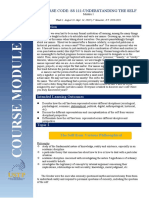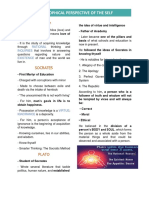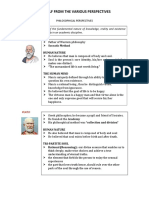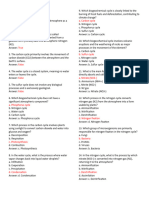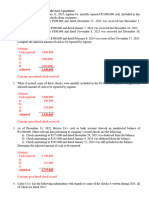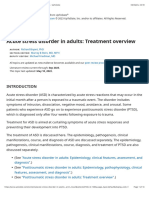0 ratings0% found this document useful (0 votes)
32 viewsChapter 1 Lesson 1
Chapter 1 Lesson 1
Uploaded by
Ysabel ApostolSocrates believed that the self is composed of both a body and soul, and that the examined life is superior. Plato expanded on this idea of a dual self, proposing that the soul has rational, spirited, and appetitive aspects. Augustine viewed humans as yearning to reach spiritual immortality with God despite an imperfect physical existence. Later philosophers like Descartes and Locke debated the relationship between mind, body, and experience in understanding the self.
Copyright:
© All Rights Reserved
Available Formats
Download as DOCX, PDF, TXT or read online from Scribd
Chapter 1 Lesson 1
Chapter 1 Lesson 1
Uploaded by
Ysabel Apostol0 ratings0% found this document useful (0 votes)
32 views4 pagesSocrates believed that the self is composed of both a body and soul, and that the examined life is superior. Plato expanded on this idea of a dual self, proposing that the soul has rational, spirited, and appetitive aspects. Augustine viewed humans as yearning to reach spiritual immortality with God despite an imperfect physical existence. Later philosophers like Descartes and Locke debated the relationship between mind, body, and experience in understanding the self.
Original Description:
rorororor
Original Title
Chapter-1-Lesson-1
Copyright
© © All Rights Reserved
Available Formats
DOCX, PDF, TXT or read online from Scribd
Share this document
Did you find this document useful?
Is this content inappropriate?
Socrates believed that the self is composed of both a body and soul, and that the examined life is superior. Plato expanded on this idea of a dual self, proposing that the soul has rational, spirited, and appetitive aspects. Augustine viewed humans as yearning to reach spiritual immortality with God despite an imperfect physical existence. Later philosophers like Descartes and Locke debated the relationship between mind, body, and experience in understanding the self.
Copyright:
© All Rights Reserved
Available Formats
Download as DOCX, PDF, TXT or read online from Scribd
Download as docx, pdf, or txt
0 ratings0% found this document useful (0 votes)
32 views4 pagesChapter 1 Lesson 1
Chapter 1 Lesson 1
Uploaded by
Ysabel ApostolSocrates believed that the self is composed of both a body and soul, and that the examined life is superior. Plato expanded on this idea of a dual self, proposing that the soul has rational, spirited, and appetitive aspects. Augustine viewed humans as yearning to reach spiritual immortality with God despite an imperfect physical existence. Later philosophers like Descartes and Locke debated the relationship between mind, body, and experience in understanding the self.
Copyright:
© All Rights Reserved
Available Formats
Download as DOCX, PDF, TXT or read online from Scribd
Download as docx, pdf, or txt
You are on page 1of 4
UNDERSTANDING THE SELF Wisdom is awareness of one’s own self-
ignorance, especially through the acquisition
LESSON 1: THE SELF FROM VARIOUS PHILOSOPHICAL of self-awareness & self-knowledge
PERSPECTIVES Self-awareness & self-knowledge were key
PHILOSOPHY to becoming an individual who can think and
Study of the fundamental nature of knowledge, reality & analyze for himself/herself.
existence, especially in an academic discipline Seeking the truth in all things by asking
A particular theory that someone has about how to live or questions and constantly dissecting all
how to deal with a particular situation viewpoints & ideas
Academic discipline concerned with investigating the
nature of significance of ordinary and scientific beliefs – Socrates’ Virtues:
investigates the legitimacy of concepts by rational Humility
argument concerning their implications, relationships as Frugality
well as reality, knowledge, moral judgement, and others. Simplicity
As used originally by the Ancient Greeks, the term Quotes
“Philosophy” meant the pursuit of knowledge for its own “As for me, all I know is I know nothing”
sake and comprised all areas of speculative thought, “False words are not only evil in themselves
including the arts, sciences, and religion. but they infect the soul with evil”
“True wisdom comes to each of us when we
PHILOSOPHY CONCERNS: THE FUNDAMENTAL NATURE OF SELF realize how little we understand about life,
The Greeks were the ones who seriously questioned myths & ourselves, and the world around us”
moved away from them to understand reality & respond to Wisdom begins in wonder”
perennial questions of curiosity, including the question of the
self. 2. PLATO
1. SOCRATES Student of Socrates
He was considered the father of Western Supported the idea of Socrates that Man is a dual
Philosophy nature of body & soul
He was concerned with the problem of the self 3 components of soul:
“The true talk of the philosopher is to know Rational soul – forged by reason and
oneself” intellect has to govern the affairs of the
“The unexamined life is not worth living” human person
Every human person is dualistic- MAN=body + soul Spirited soul – in charge of emotions should
(every man is composed of body and soul) be kept at bay
Individuals have imperfect/impermanent aspects Appetitive soul – in charge of base desires
(body) and + perfect/permanent aspects (soul) (eating, drinking, sleeping, having sex) are
Socrates’ Beliefs: controlled. When this ideal state is attained,
then the human person’s soul becomes just If something is so clear and lucid as not to be
& virtuous. doubted, that’s the only time one should believe
He loves the whole of wisdom and is The only thing we can’t doubt is the existence of the
satisfied with nothing else self
3. ST. AUGUSTINE I think therefore I am
His view of human person reflects the entire spirit The self = cogito (the thing that thinks) + extenza
of the medieval world when it comes to man. (extension of mind/body
Followed the view of Plato but added Christianity The body is a machine attached to the mind
Part of man dwells in the world (imperfect) and It’s the mind that makes the man
yearns to be with the Divine “I am a thinking thing…a thing that doubts,
Another part is capable of reaching immortality understands, affirms, denies, wills, refuses,
o Body dies on earth imagines, perceives”
o Soul lives eternally in spiritual bliss with God
Major Themes: 6. JOHN LOCKE (Tabula Rasa)
o Search for happiness is not easy Most important works:
o Struggle as an adolescent to believe in God o An Essay Concerning Human Understanding
and live a virtuous life o Two Treaties of Civil Government
o Virtue as character strengths that develop o A Letter Concerning Toleration
over time Major works essay concerning human
o Sexuality and Holiness – can we bridge the understanding:
2? o In his essay Locke tries to determine the
limits of our understanding, discussing the
4. ST. THOMAS AQUINAS sources of human knowledge and what can
Man= matter + form (2 parts) and what cannot be known
Matter (hyle) – the common staff that makes up o He argues that people are not born with
everything in the universe innate knowledge, but rather that their mind
Form (morphe) – the essence of a substance or is a tabula rasa, a blank slate on which the
thing (what makes it what it is) tread of experience writes
The body of the human is similar to animals/objects, o All humanity is born equal in the realms of
but what makes a human is his essence natural intelligence
The soul is what makes us humans o The father of modern philosophy,
expounded the theory that all knowledge
5. RENE DESCARTES should be proven as illustrated by his
Father of modern philosophy famous statement “ I think, therefore I am”
Human person = body + mind o Locke reportedly declared that he would
“There is so much that we should doubt” “rather learn Descartes than Aristotle”
o Locke developed his ideas in a very different “Time space, etc. are ideas that one cannot find in
direction rather than Descartes, he rejected the world but is built in our minds “apparatus of the
his predecessor’s conviction in the existence mind”
of innate ideas The self organizes different impressions that one
o Locke believed that man is not born with gets in relation to his own existence
innate ideas, but rather develops his ideas We need active intelligence to synthesize all
by means of experience knowledge and experience
The self is not only personality but also the seat of
7. DAVID HUME knowledge
Disagrees with all the other aforementioned
philosophers 9. SOREN KIERKEGAARD
“One can only what comes from the senses and Soren Kierkegaard asked himself the question,
experiences” (he is an empiricist) "What is the human being?"
“the self is not an entity beyond the physical body” His answer was, "a human being is spirit.
You know that other people are humans not But what is spirit? Spirit is the self.
because you have seen their souls, but because you But what is the self? The self is a relation that
see them, hear them, feel the, etc. relates to itself.
“the self is nothing but a bundle of impressions and Then, who is it that establishes such a relation?
ideas” It must be a third party, a reality other than one's
Impression – basic objects of our own self-and that reality is none other than God
experience/sensation – forms the core of our Himself according to Kierkegaard.
thoughts Therefore, the original self is the self that stands
Idea – copies of impressions – not as real as before God, Kierkegaard concluded.
impressions Kierkegaard criticized people for their
Self = a collection of different perceptions which irresponsibility and their lack of conscience.
rapidly succeed each other He asserted that, in order for people to actualize
Self = in a perpetual flux and movement > We want their true human nature, they must depart from
to believe that there is a unified coherent self, soul, the world of the public and stand before God all by
mind, etc. But actually – it is all just a combination themselves each as an individual.
of experiences
10. KARL MARX
8. IMMANUEL KANT Marx did not believe that there is no such thing as
Agrees with Hume that everything starts with the nature of man
perception/sensation of impressions Disagreed with John Locke that man at birth is like a
There is a MIND that regulations these impressions TABULA RASA or blank sheet.
Marx started out with the idea that man can be Key notion:
defined as a man not only biologically, anatomically, There is a lower level to the personality which is
and physiologically, but also psychologically. below the conscious
Marx said: "To know what is useful for a dog, one This lower level is the scene of the action for
must study dog nature. This nature itself is not to be forbidden motives, painful memories, and
deduced from the principle of utility. disturbing ideas
Applying this to man, he who would criticize all Personality is composed of a conscious mind, a
human acts, movements, relations, etc., by the preconscious mind, and an unconscious mind
principle of utility, must first deal with human The conscious mind has knowledge of what is
nature in general. happening in the present
Marx's point is clear. It is irrational to dogmatize The preconscious mind contains information from
what is useful to anything without first both the unconscious and conscious mind
understanding correctly what you are talking about. The unconscious mind contains hidden or forgotten
Insight into, and a critical analysis of, the "nature" of memories or experiences
something should anticipate any attempt to decide the division of the personality into the id, ego, and
what is useful or harmful to it. This applies in a superego;
special manner in the case of human nature. the unconscious; anxiety; the functioning of ego-
defense mechanisms;
11. SIGMUND FREUD
Freudian view of human nature:
He views human nature as dynamic – that there is
an exchange of energy and transformation.
His view of human nature is basically deterministic.
It is based on the belief that our behavior is
determined by irrational forces, unconscious
motivations, and biological and instinctual drives as
these evolve through key psychosexual stages in the
first six years of life.
Basically deterministic and focuses on irrational
forces, biological and instinctual drives, and
unconscious motivation, later developments in
psychoanalysis stressed social and cultural factors.
Emphasis
The development of the ego and the differentiation
and individuation of the self.
You might also like
- Understanding The Self ReviewerDocument2 pagesUnderstanding The Self Reviewerarjun adame86% (28)
- Liz Greene - Transits and ProgressionsDocument5 pagesLiz Greene - Transits and ProgressionsRakeshVadekar100% (1)
- Uts ReviewerDocument5 pagesUts Reviewerc100% (1)
- Unit Ii: An Embodied Spirit Coexisting With The Environment: Check Point: Manifest Truth (MT) or False (F)Document8 pagesUnit Ii: An Embodied Spirit Coexisting With The Environment: Check Point: Manifest Truth (MT) or False (F)John Andrae Manglo100% (1)
- Understanding The Self REVIEWERDocument4 pagesUnderstanding The Self REVIEWEREmjhay SarzuelaNo ratings yet
- Philosophical Perspective of The SelfDocument7 pagesPhilosophical Perspective of The SelfRacquel BanaoNo ratings yet
- Understanding The Self - Pre-FinalDocument4 pagesUnderstanding The Self - Pre-FinalMichael John PedrajasNo ratings yet
- Module 1: Philosophical Perspective of The SelfDocument21 pagesModule 1: Philosophical Perspective of The SelfJesseca JosafatNo ratings yet
- UTS Reviewer - CHAPTER 1Document21 pagesUTS Reviewer - CHAPTER 1ricardosumagang29No ratings yet
- Uts Reviewer ColorDocument19 pagesUts Reviewer Colorricardosumagang29No ratings yet
- Lesson 1Document7 pagesLesson 1CHRISTINE DE VERANo ratings yet
- Module 1: The SELF From Various Philosophical PerspectivesDocument2 pagesModule 1: The SELF From Various Philosophical Perspectivesyannieee crbtNo ratings yet
- Lesson 1 UTSDocument8 pagesLesson 1 UTSGrace MendezNo ratings yet
- C.1 Lesson 1study NotesDocument4 pagesC.1 Lesson 1study NotesRonalda GuevarraNo ratings yet
- REVIEWERDocument9 pagesREVIEWERearlNo ratings yet
- UtsDocument7 pagesUtskizynonNo ratings yet
- Reviewers For Minor SubsDocument17 pagesReviewers For Minor Subshyajiko5No ratings yet
- Uts HandoutDocument27 pagesUts HandoutChristy OlapaniNo ratings yet
- Uts Reviewer MongeDocument4 pagesUts Reviewer MongeAries OrpheusNo ratings yet
- Understanding The Self Midterm ReviewerDocument6 pagesUnderstanding The Self Midterm ReviewerJoylyn MangadlaoNo ratings yet
- Ge1 PrelimDocument4 pagesGe1 PrelimIexenne FigueroaNo ratings yet
- Understanding The SelfDocument9 pagesUnderstanding The SelfAlliah Gianne JacelaNo ratings yet
- MODULE 1 - Lesson The Self From Various Philosophical PerspectiveDocument6 pagesMODULE 1 - Lesson The Self From Various Philosophical PerspectiveKaye Charmaine Galeon100% (1)
- Understanding SelfDocument4 pagesUnderstanding SelfXander Bryle Harington100% (1)
- W1-W8 Reviewer in UtsDocument17 pagesW1-W8 Reviewer in UtsKristine Sierra LimbocNo ratings yet
- Philosophical Perspective of The Self: What Is Philosophy?Document5 pagesPhilosophical Perspective of The Self: What Is Philosophy?Janina Janine Malinao0% (1)
- Binalatongan Community College: Bachelor of Elementary Education (BEED) Learning ModuleDocument8 pagesBinalatongan Community College: Bachelor of Elementary Education (BEED) Learning Modulephilip resuelloNo ratings yet
- Gec101 Math 1B Group 1Document19 pagesGec101 Math 1B Group 1John Mark Gabriel CepidaNo ratings yet
- PhilosophicalDocument5 pagesPhilosophicalNako YabukiNo ratings yet
- Understanding The Self - PhilosophiesDocument7 pagesUnderstanding The Self - PhilosophiesJohn Paul Villanueva BelloNo ratings yet
- Understanding The SelfDocument7 pagesUnderstanding The SelfPrincess Cruz100% (1)
- The Different Interrelation inDocument19 pagesThe Different Interrelation inBraylee MontenegrosNo ratings yet
- Inbound 7761646470590473045Document4 pagesInbound 7761646470590473045Leyah GemNo ratings yet
- Philosophical Self LENSDocument6 pagesPhilosophical Self LENSAngelica SingsonNo ratings yet
- Understanding The Self Week 1Document3 pagesUnderstanding The Self Week 1Athena AlabadoNo ratings yet
- Philosophical Perspective of The Self: 1. SocratesDocument4 pagesPhilosophical Perspective of The Self: 1. SocratesRamzen Raphael DomingoNo ratings yet
- Chapter 1 Philosophical Perspective of The Self What Is Understanding Self PDF FreeDocument10 pagesChapter 1 Philosophical Perspective of The Self What Is Understanding Self PDF Freechachamporado000No ratings yet
- Understanding The SelfDocument3 pagesUnderstanding The SelfJosca Villamor BasilanNo ratings yet
- UTS Week 2-4Document4 pagesUTS Week 2-4mtsacramento2684pamNo ratings yet
- Breakdown For Mid-TermsDocument7 pagesBreakdown For Mid-TermsJenky Eno IINo ratings yet
- 1 - Philoposophies in Understanding The SelfDocument15 pages1 - Philoposophies in Understanding The SelfWinona BartolomeNo ratings yet
- 1 - Philoposophies in Understanding The SelfDocument15 pages1 - Philoposophies in Understanding The SelfWinona Bartolome100% (1)
- HUM 001: Understanding The Self USI Vincentian Learning ModuleDocument6 pagesHUM 001: Understanding The Self USI Vincentian Learning ModuleschoolpeteNo ratings yet
- PhilosophyDocument3 pagesPhilosophyEx PertzNo ratings yet
- Lesson 1 The Philosophical SelfDocument7 pagesLesson 1 The Philosophical SelfPALABAO DANIELNo ratings yet
- Module 1. Philosophical PerspectiveDocument25 pagesModule 1. Philosophical PerspectiveNIcole Anne SoriaNo ratings yet
- (Notes) THE SELF FROM THE VARIOUS PERSPECTIVESDocument4 pages(Notes) THE SELF FROM THE VARIOUS PERSPECTIVESPrincess GinezNo ratings yet
- Lesson 2 The Self According To PhilosophyDocument25 pagesLesson 2 The Self According To PhilosophySamantha Angeline TerceroNo ratings yet
- Lesson 1Document19 pagesLesson 1hawkmatrixbrizNo ratings yet
- UTS NotesDocument10 pagesUTS NotesAli MarieNo ratings yet
- LP 1 in UTSDocument8 pagesLP 1 in UTSTrisha Mae Ladeza GrafilNo ratings yet
- Reviewer in UTSDocument9 pagesReviewer in UTShyajiko5No ratings yet
- Perps-Understanding The Self-Ch 1Document37 pagesPerps-Understanding The Self-Ch 1Maitreyee DhobleNo ratings yet
- Undself: PhilosophersDocument7 pagesUndself: PhilosophersShihNo ratings yet
- Understanding The Self Notes 1Document3 pagesUnderstanding The Self Notes 1grinobenedictNo ratings yet
- UTS-Midterms-ReviewerDocument8 pagesUTS-Midterms-ReviewerAlexa Luz PeridaNo ratings yet
- Understanding The Self Handouts and Notes For The 1st Year Students in Urs - CompressDocument35 pagesUnderstanding The Self Handouts and Notes For The 1st Year Students in Urs - CompressPielogy 101No ratings yet
- IHIPDocument6 pagesIHIPAna rose VeluntaNo ratings yet
- Uts Reviewer 1Document11 pagesUts Reviewer 1nishimurasunoo3No ratings yet
- The Self From The Various Perspectives: PhilosophyDocument4 pagesThe Self From The Various Perspectives: PhilosophyPrincess GinezNo ratings yet
- Acctg 102 Prelim Exam With SolutionsDocument12 pagesAcctg 102 Prelim Exam With SolutionsYsabel ApostolNo ratings yet
- Acctg 102 Semi Final Quiz 5 With SolutionsDocument10 pagesAcctg 102 Semi Final Quiz 5 With SolutionsYsabel ApostolNo ratings yet
- Ma 105 Module 1Document3 pagesMa 105 Module 1Ysabel ApostolNo ratings yet
- Envisci Quiz 3Document3 pagesEnvisci Quiz 3Ysabel Apostol100% (1)
- Acctg 102 Prelim Quiz 1 With SolutionDocument9 pagesAcctg 102 Prelim Quiz 1 With SolutionYsabel ApostolNo ratings yet
- Data Gathering ProcedureDocument1 pageData Gathering ProcedureYsabel ApostolNo ratings yet
- Inverse Operations Lesson PlanDocument3 pagesInverse Operations Lesson Planapi-357246840No ratings yet
- Acute Stress Disorder in Adults: Treatment Overview - UpToDateDocument14 pagesAcute Stress Disorder in Adults: Treatment Overview - UpToDateJoão VictorNo ratings yet
- Symbolism of Space in Handwriting: Graphology 2Document8 pagesSymbolism of Space in Handwriting: Graphology 2bjdevhervehroheghghbhbhotbhhortbhNo ratings yet
- Ten Commandments PracticesDocument19 pagesTen Commandments PracticesIvan MrkvcNo ratings yet
- 10 - What%u2019s Usual in TheDocument4 pages10 - What%u2019s Usual in TheAlejo GomezNo ratings yet
- Pds UpdatedDocument2 pagesPds Updatedapi-609488951No ratings yet
- General Management TopicsDocument25 pagesGeneral Management TopicsEkala XuhalxNo ratings yet
- Chapter 4 Lesson 1 Ethical RequirementsDocument11 pagesChapter 4 Lesson 1 Ethical RequirementsRevy CumahigNo ratings yet
- #4 Reaction PaperDocument5 pages#4 Reaction PaperJohn Mark BartolomeNo ratings yet
- The X-Rite Color Challenge and Hue TestDocument7 pagesThe X-Rite Color Challenge and Hue TestJudson ChristudasNo ratings yet
- Steven Doss - Letter of Intent For Rcs Capstone ExperienceDocument2 pagesSteven Doss - Letter of Intent For Rcs Capstone Experienceapi-458424290No ratings yet
- Summary of Chester Barnard Contribution To Theory of OrganizationDocument2 pagesSummary of Chester Barnard Contribution To Theory of OrganizationAadiMalik86% (7)
- Lifetime Sports Syllabus: Course DescriptionDocument3 pagesLifetime Sports Syllabus: Course Descriptionanon-579447No ratings yet
- Shelly Bullards Love Lessons1Document16 pagesShelly Bullards Love Lessons1Jacqueline FullerNo ratings yet
- Stakeholder MapDocument3 pagesStakeholder MapAriel MaganaNo ratings yet
- Unit Guide - CB - Tr1.2022-2023 - Final 1Document25 pagesUnit Guide - CB - Tr1.2022-2023 - Final 1Trúc Nguyễn ThanhNo ratings yet
- Quiz On Personal DevDocument1 pageQuiz On Personal DevEdita AquinoNo ratings yet
- Nur Aiman 169369Document5 pagesNur Aiman 169369Nur Aiman Nor DinNo ratings yet
- Listening: What Is?Document2 pagesListening: What Is?Sofia S ExcelsiorNo ratings yet
- The Social SelfDocument7 pagesThe Social SelfPatricia Ann PlatonNo ratings yet
- PEOPLE V. GENOSA 341 SCRA 493 G.R. No. 135981Document29 pagesPEOPLE V. GENOSA 341 SCRA 493 G.R. No. 135981yanyan yuNo ratings yet
- And Validat On: Guide For Instrulllent DeveloplllentDocument12 pagesAnd Validat On: Guide For Instrulllent DeveloplllentSyafira TiaradipaNo ratings yet
- Personality Development of Girls Studying in NPEGEL and Non-NPEGEL SchoolsDocument7 pagesPersonality Development of Girls Studying in NPEGEL and Non-NPEGEL SchoolsinventionjournalsNo ratings yet
- Engineering Management - Selection Process and StaffingDocument3 pagesEngineering Management - Selection Process and StaffingJesimie OriasNo ratings yet
- ShelbyDocument2 pagesShelbyapi-452061342No ratings yet
- MBO Management by Objectives Performance Appraisal Employee EvaluationDocument2 pagesMBO Management by Objectives Performance Appraisal Employee EvaluationFranko MallanNo ratings yet
- Self-Assertion Skills: TI 043 - ThematicDocument30 pagesSelf-Assertion Skills: TI 043 - ThematicteatweetyNo ratings yet
- (English) Maxene Magalona Opens Up About Her Mental Health Condition - Toni Talks (DownSub - Com)Document20 pages(English) Maxene Magalona Opens Up About Her Mental Health Condition - Toni Talks (DownSub - Com)Kesi LeañoNo ratings yet
- Challenges and Success: Managed To Gave inDocument2 pagesChallenges and Success: Managed To Gave inMari Carmen Pérez Gómez100% (1)






















